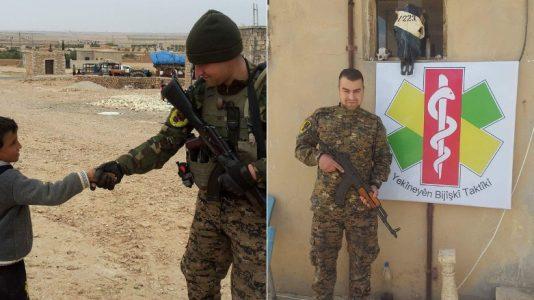
British volunteers in Syria took on ISIS and now they face possible arrest back home
In the battle to expel ISIS from Raqqa, at least one Western volunteer faced off against the extremists on the front lines with Kurdish troops.
He’s a 30-year-old British former currency trader who goes by the pseudonym Macer Gifford.
“We were the ones in the city taking the ground, taking the buildings, fighting in the stairwells, fighting in the cellars, whereas the Americans and Brits were mostly the ones flying the drones,” Gifford says.
Just a few years ago, Gifford was leading a much more comfortable existence. He had a lucrative job and a steady girlfriend. But he couldn’t stop watching the news. Images of gruesome beheadings and atrocities perpetrated by ISIS militants stuck in his mind. That’s when Gifford decided to take a step some might consider foolhardy.
“I don’t have a death wish,” he says. “I have a very loving family, I care passionately about Britain and my community in the UK and just getting on with life. At the same time as an internationalist, I couldn’t just sit by and watch the Islamic State do what is was doing.”
So Gifford traveled to Syria and joined the Kurdish rebels combating ISIS. He’s been fighting on and off for three years, most recently in the battle for Raqqa.
Now, he’d like to return to the UK, but that might not be easy. British law is vague about whether or not it’s legal for British volunteers to fight abroad. It’s clearly illegal to take up arms in opposition to Britain’s allies or interfere with British interests abroad. But when it comes to Gifford’s case, much is uncertain.
“I’ve gone and many other people have gone to fight against terrorists, brutal terrorists that are enemies of the UK and hurting us both at home and abroad,” Gifford says. “The real trouble in the UK is that the Home Office has almost wiped its hands of all this and simply said to the local police forces and counterterrorism officials, ‘It’s up to you whether you want to arrest these people. You arrest them under suspicion of terrorism which is a very broad term. And it’s up to you to try and seek a prosecution.'”
According to Gifford, some British volunteers fighting with the Kurds have been arrested. None of them have been successfully prosecuted. He thinks the volunteers’ online media presentations and their candor about who they fought for might help their case.
“A lot of us have been very open and honest online on social media,” he adds. “There’s no need to make an arrest, particularly when we’re so keen to offer up who we are.”
Source: PRI





